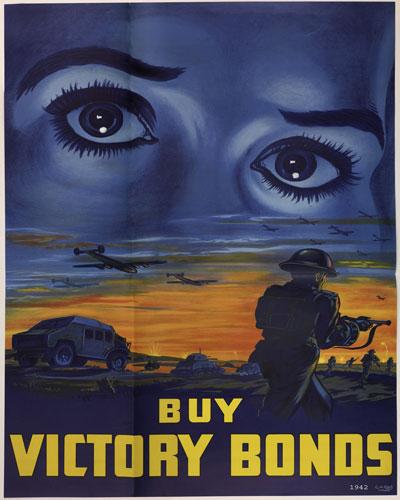A 1942 radio drama imagined what life in Fredericton could have been like under Nazi rule.
Matt Carter

It’s almost hard to imagine a world without an abundance of in-home entertainment options like video games, hundreds of television channels and the vast amount of programming provided by streaming services. But at one time, radio – that simple signal on your dial – united the country and brought both news and entertainment into practically every household from coast to coast.
Although they are often looked at with an overwhelming sense of nostalgia these days, radio dramas were once a big part of many station’s identities. Thrillers, horrors, romance, comedies, just about everything we now consume through various sized screens once happened in the audio-only world of radio.
While the majority of these programs existed simply for the sake of entertainment, others served as propaganda tools carrying carefully crafted messages hidden between storylines and characters. The popular BBC Radio 4 drama The Archers – a fictional story about a farming family living in the English countryside – first aired in 1950 with an aim to educate farmers as the country worked to get back on its feet following World War II.
In Canada, the CBC carried all sorts of informative programming as part of the war effort aimed at uniting the country against the threat of Axis forces. One particular program, Nazi Eyes on Canada, employed radio drama’s familiar form to present stories that imagined Canada under Nazi rule. Created by the National War Finance Committee in an attempt to encourage the purchase of war bonds, this five part series featured a star-studded cast with some of radio’s most recognized entertainers including Orson Wells, Vincent Price, Lorne Green and a young Lister Sinclair, who would later become a prominent player in CBC radio dramas following the war as well as the host of the station’s long-running program, Ideas.
Set in small communities across the country like High River, Alberta, and Alameda, Saskatchewan, Nazi Eyes on Canada profiled a real Canadian family or individual and examined how their lives were when the series aired in 1942, and what they might be like in a future under the Nazi regime.
The full series was inspired in part by the Vienna-born writer and traveler Colin Ross, who authored fifteen books on his world travels and later served as an advisor to the German Foreign Ministry during the war. Ross, born of Scottish decent, was officially declared a Nazi agent by the U.S. State Department in 1940 after more than 20 years spent traveling the world.
“I’m glad to be in Canada. I’ve met your soldiers in England and in Scotland. I know your sons in Air Force blue who fly over Germany and Libya and Burma,” said the series’ host and war correspondent Quentin Reynolds in his introduction to each episode. “I’ve seen your Canadian Navy in action in the North Atlantic. I have an undying admiration for Canada. I have no admiration for the Nazi spy whose footsteps we’ve been retracing across Canada. No, I have no admiration for the renegade who chooses to call himself, Colin Ross.”
Maritimes Under the Nazis, the fourth episode in the series takes place in Fredericton, New Brunswick and includes mentions of the provincial legislature and the Saint John River.
“It’s a story of Fredericton, New Brunswick, down east in your lovely Maritime Provinces. And of Sandy Smith and his family,” said Reynolds in his opening narration.
According to Reynolds, H. Alexander (Sandy) Smith ran a service station in Fredericton while his two sons were fighting overseas.
Following in introduction to the story and the Smith family, the episode progresses into a fictional time after Halifax has fallen to invading forces, eventually leading to the occupation of Fredericton. Separated from his family, Sandy Smith ends up on the run from authorities before eventually being caught in an attempt to assassinate a high ranking official as his motorcade passes the New Brunswick Legislature Building.
The episode concludes with the real-life Sandy Smith commenting on the fictional dramatization of his family as portrayed in the episode.
“It is a strange feeling to hear your own life broadcast over the air,” said Smith. “It is an even stranger feeling to hear what might happen to a man’s own family if we lose this war. The only thing that matters to me in this world is my family. And so help me God, everything I have and everything I am are in this thing to the finish. We must not lose this war.”
Flight Sergeant Albert Alexander Smith, one of two Smith sons to fight overseas, died on May 16, 1942 near Samsø, Denmark.
Listen to the complete episode Maritimes Under the Nazis.




